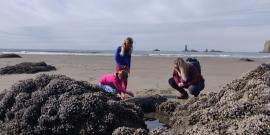
Olympic Peninsula Hiking Safety - Make Sure Your Hike Ends at Home
Staying Safe on Your Olympic National Park Vacations - Do I Need to Carry Bear Spray?
Wilderness hiking can always be rendered safer, through good planning, awareness, and place-based education. Are there Grizzly Bears in Olympic National Park? How would the presence of Grizzly Bears change your planning for safe day hikes on the Olympic Peninsula?
Since Olympic National Park only has Black Bears, carrying bear spray is not advised. Instead of bear spray, make sure that you never leave food unattended and if you are backpacking, you want to use a bear can. Remember, a fed bear is a dead bear!
Exploring Tidepools with Safety in Mind - Did you Know that People Die each year from Killer Beach Logs?
Tidepooling beaches are generally not swimming beaches. Most swimmers are also surfers and wear wet suits. If you want to safely swim on the Olympic Peninsula, go to a lake.
Beach logs are moved by powerful waves during storm surges and high tide events.
The tide comes in the fastest half way between low and high tide so be especially attentive during this time.
Know when the high and low tides are by checking a local tide table
Test your sturdy footwear on slippery rocks before stepping fully onto them and if possible avoid stepping on rocks.
Avoid walking on mussel and barnacle beds.
In the Pacific Northwest: don't touch sea jellies (jellyfish) with color, mind the large crabs, and don't get bit by an octopus.
If you tide pool in other parts of the world, there will likely be other dangerous animals, so check locally.
Wasps, bees, and hornets - Are stinging insects a problem on the Olympic Peninsula?
Olympic National Park lacks many poisonous plants and venomous animals that are common in other parts of the Americas. In general, you will not be bitten by insects or get a terrible rash if you grab onto plants while hiking, walk around in high grass, or sit down on woody debris.
Although insect bites are generally uncommon, stinging insects like wasps can cause some Olympic Peninsula hiking safety considerations for those with severe allergies such as anaphylaxis. Depending on weather conditions, foraging wasps can become especially aggressive during late summer and fall.
Large mammals - Why does having a dog off-leash in wilderness make its owner more vulnerable to a dangerous wildlife encounter?
While quite a few potentially dangerous North American mammals will not be found during your Olympic Peninsula hike (no Grizzly Bear, for example), the park does have Mountain Lions (alternatively called "cougars"), Black Bears, and Roosevelt Elk - all large mammals that warrant our attention. The park posts signs describing any current wildlife hazards at trailheads and campgrounds.
Since hunting is not permitted in Olympic National Park, wildlife viewing can be prolonged and exciting. Many animals are habituated to human presence and are therefore much easier to view and photograph. However, wildlife should not be approached, especially during mating season or when young are being protected by their mothers.
Aggressive behavior or overly bold behavior by wildlife often results from prior contact with human food. Food should not be left unattended.
When possible, it is always best to hike with someone else. If this is not possible, consider planning your Olympic Peninsula hikes on well-used trails during summer weekends for Olympic Peninsula hiking safety considerations. Hiking in small groups is one of the ways to avoid encounters with black bears while hiking or camping according to the Washington Department of Fish and Wildlife (WDFW).
According to WDFW's Playing in Bear Country, "dogs were a factor in more than half of 92 cases of bears attacking people between 2010 and 2014. Most dogs were off leash, and most likely surprised the bear and then led it back to their owner. One person was killed and many were injured, some seriously; 25 dogs were injured or killed. If you love your dog, keep it on a short leash at all times in bear country."
